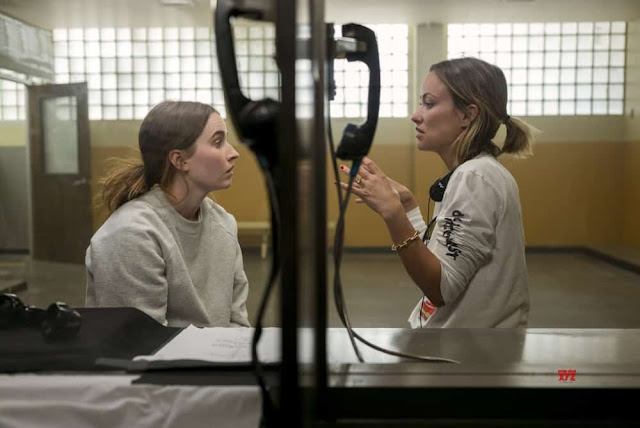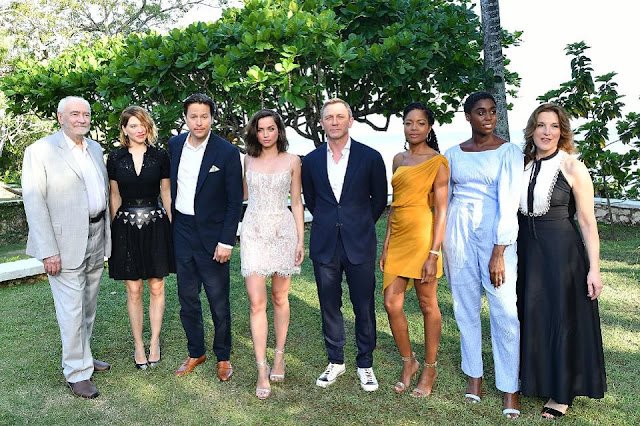Why Marvel Hired Olivia Wilde To Direct Their Alleged Spider-Woman Flick
From indie hit (Booksmart), to mid-budget genre flick (Don't Worry, Darling) to Marvel blockbuster, Olivia Wilde joins the likes of Nia DaCosta and Niki Caro as the first batch of female directors to take the old-school path of building a career from the ground up
 |
| Olivia Wilde directs Katelyn Dever 'Booksmart' (CREDIT: United Artists Releasing) |
by Jack Linsdell
The grimly ironic timing of a global pandemic hitting us in 2020 is that this was supposed to be a milestone year for "not a white guy" filmmakers to shine and prove their movies can still kick box office butt. 2020 was not only meant to be the first time in recent years that Disney would not dominate the year-end "top ten global grossing movies" chart, but also the one that pushed inclusivity and diversity within the industry hardest. Heading into the year, almost all of the biggest blockbusters were to be directed by women, including Cathy Yan's Birds of Prey, Niki Caro's Mulan, Patty Jenkins' Wonder Women 1984, Cate Shorthand's Black Widow and Chloe Zhao's Eternals. Not only were women front and centre behind the camera (something that has long been overdue), but the likes of Marvel's Eternals and Disney's Mulan also sported female directors from Asian backgrounds. Heck, add in the likes of Nia DaCosta helming Universal's Candyman remake this fall and Nisha Ganatra directing their music dramedy The High Note, it's fair to say that 2020 was not only the year female directors got the opportunities they deserve, but women from ethnic backgrounds too. But, COVID-19 had other ideas and those movies have mostly either been pushed into 2021 (where they'll face harsher competition from male directed blockbusters) or have been given a steaming/PVOD debut that has somewhat lessened their prestige status from being "theatrical releases".
Anyway, last week came news of one small consolation that may offer some hope that going forward, studios will continue putting women (from all backgrounds) centre stage behind the camera. Marvel has apparently hired actor-turned-director Olivia Wilde to helm a female-centric superhero movie, allegedly based on Spider-Woman. Look, for all the grief we give superhero movies for steam rolling everything else on any given year's theatrical slate and creating "superhero mania", the likes of Marvel and DC are doing the most to make sure women are getting the same opportunities as men when it comes to directing the biggest blockbusters. Whether it's for selfish reasons (media-friendly publicity, commercial viability etc.) or a genuine desire to "change" things, the folks making the superhero blockbusters are giving female filmmakers the platform they deserve. As for Wilde, she's always been an incredibly talented (and underrated) actress, whose recent debut into directing has also proven her to be one of the "ones of watch" for the future. But, most of all, Wilde is part of the first batch of female filmmakers to take the old-school path of (slowly) building your career up as a director.
Back in the day, the path for directors into the industry would be what I call the three-stage development plan. Firstly, they'd direct an indie movie, that'd become an underrated, sleeper hit and win them praise as an "exciting new filmmaker" with a unique voice and visual style. This would take them into stage two, in which impressed studios would hire them to helm a mid-budget, genre based, programmer. This would allow a given filmmaker to become familiar with bigger budgets, more complex productions and the whole studio system, without the pressure and expectation of being a big "must hit" franchise movie or blockbuster. Then, if that hit pay dirt, they'd move into stage three and get the keys to a $150 million, star-driven blockbuster. The beauty of this system is that it takes time to nurture exciting indie filmmakers into the world of commercial and entertainment-first movies, whilst slowly building them up with budget and production scale. When the likes of Josh Trank or Michael Gracey go from indie hit (or never directed before) to Fantastic Four ($155 million budget) and The Greatest Showman ($85 million), it's only reasonable that more experienced filmmakers are tasked with overseeing production and/or reshoots to keep the projects on track in their place.
Nia DaCosta went from the utterly terrific Lily James/Tessa Thompson indie hit Little Woods to helming the upcoming Jordan Peele-produced studio programmer Candyman. Next, she's tackling a Marvel blockbuster with Captain Marvel 2, the sequel to the 2019 smash hit. Niki Carro started her career with the indie family drama Whale Killer in 2002, which went on to earn $44 million worldwide on only a $3.3 million budget. This led her into the realm of the studio mid-budget programmer with the likes of Warner Bros.' star-studded drama North Country and Focus Features' insanely good Jessica Chastain "based on true events" flick The Zookeeper's Wife. This year, she helmed Disney's $200 million Mulan which is the biggest budgeted movie ever for a woman to direct. And, joining them is Olivia Wilde. She made her directing debut last year with the critically acclaimed and masterfully done teen comedy Booksmart. A BAFTA nomination, $24 million on a $6 million budget and topping most critics "top ten movies of the year" lists later and Wilde secured herself a star-studded thriller Don't Worry, Darling with New Line Cinema. That Florence Pugh/Dakota Johnson/Chris Pine/Shia LeBeouf flick will reunite Wilde with Booksmart scribe Katie Silberman and prove to the world she can make funny comedies and suspenseful thrillers too. After that has started filming and come out, Wilde will move into the Marvel blockbuster realm with the first big screen adaption of Spider-Woman (if all the sources are to be believed). So, why has Marvel hired Wilde?
Well...firstly, Wilde is an exciting "new" filmmaker, with a huge amount of on-set experience as a prestigious actor. She's been on big movie sets before like Tron Legacy and Cowboys & Aliens numerous times and knows how these big productions work having been on the inside all these years. As I said in my review for Booksmart last May, Wilde showcased some serious talent and filmmaking craft in what is probably one of the best and most polished debut features for a director ever. When I first saw that one-take argument scene between Beanie Feldstein and Katelyn Dever in the third act, my mind was seriously blown. So, the notion of Wilde and Silberman teaming up on a star-studded thriller and then a Marvel female centred superhero flick is most exciting. But, also, Wilde certainly fits the bill with what Marvel have been doing recently. All their 2020 movies were to be directed by women, so Wilde's hiring for a potential Spider-Woman movie is not a surprise.
So, a combination of years of valuable on-set experience as an actor, a caulking and exponentially successful debut directorial feature and fitting the bill for being "not a white guy" filmmaker is why Marvel hired Wilde. And, because she's focused on building her filmmaking career from the ground up starting with an indie darling, then a mid-budget programmer, Wilde will also have the experience and skillset to pull off a Marvel blockbuster all on her own. The fact that Wilde, DaCosta and Caro are leading the way for women behind the camera is great. But, most of all, the fact that they are doing in the old-school and proper way, is even better.


Comments
Post a Comment